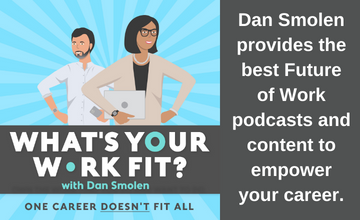Podcast: Play in new window | Download (Duration: 25:06 — 34.5MB)
Strategize for your future work success to find and do the work of your dreams.
Paired with dreams, exploration, and action, strategy helps us to achieve career success. These four components weave together like DNA, in countless combinations, to create a pathway for people to seek and do meaningful work.
In this episode, Dan Smolen recalls an experience from his junior year of college. Back then, he engaged with Associate Professor of Advertising Howard Cogan. Howard was also a successful advertising executive who wrote, voiced, and produced radio commercials. As Dan’s mentor, Howard encouraged Dan to pursue opportunities in a channel of advertising agency work called direct marketing.
Dan recalls Howard’s sage advice to strategize for future work success:
“You’re going too need to get strategic about your career. [It looks like] you may not find your opportunity on the agency side quickly. But, perhaps you can find an entry-level assignment that’s close enough and allows you to develop direct marketing skills and talents that you will need in agency life.”
Two years into that first role, Dan had proven himself to be an on-the-job success. And the skill and experience he gained helped him land a dream agency assignment in Minneapolis/St. Paul. He was just 24 years old.
Also in this episode:
Dan speaks with Rich Gee of Rich Gee High Performance Coaching. As a nationally recognized career coach, Rich helps his clients get strategic in their career development so they may achieve phenomenal success. Interview starts at 11:47
When you strategize for future work success, your career dreams can come true.
About our guest:
Rich Gee was a successful executive in the market research space before finding his bliss as a nationally recognized career coach and principal of Rich Gee High Performance Coaching. He earned a Bachelor of Arts from Ripon College and certification from Coach University. Rich lives and works in Stamford, Connecticut.
EPISODE DATE: May 21, 2021
Social media:
– Website
